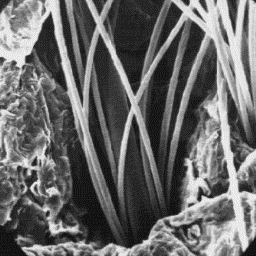 Lutreola lutreola
Lutreola lutreola
-----------------
English: Mink
German: Nerz
French: Vison
Spanish VisĒn o Marta
Distribution areas
------------------
The continental mink lives in North-
-Eastern Europe and is scarcer in the Middle
and Western European countries. Owing to the
escape of American minks raised on fur
farms, the continental mink is particularly
crossed with this species (Lutreola vison).
Both varieties of mink are very similar. The The surface structure
American variety, which has a shorter head of the skin, 200x
and a backbone that is shorter by two
vertebrae, is now most often raised on the farms.
Description of the fur
----------------------
The skins are from 40 to 60 cm long. The coat is dark-brown in colour. The
guard hairs are lustrous and grow distinctively over the undercoat.
|
|
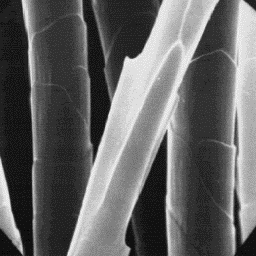 Lutreola lutreola
Lutreola lutreola
-----------------
English: Mink
German: Nerz
French: Vison
Spanish VisĒn o Marta
The undercoat fibres are moderately
crimpled and lightly coloured grey-brown.
The length of the fine fibres is about 8 mm;
the guard hairs are straight and from 20 to
30 mm long. By improving some new colour
mutations, black, grey, light-brown or white
skins were obtained.
Structure of the hair The cuticular structure
--------------------- of the fine fibres, 2000x
The microscopic structure of the skin is
furrowed; the hair follicles are narrow with straight edges. The average
follicle contains cluster of 10 to 20 hairs.
The fine fur fibres are from 8 to 20 µm in diameter. The cross-sectional
outline is circular at the bottom, and straight-sided in the middle and upper parts of the
shafts. The cuticular scales are cornet-like close to the skin surface but
most of the cuticle consists of petal-like scales. The scale surface is
smooth; the margins are straight.
|
|
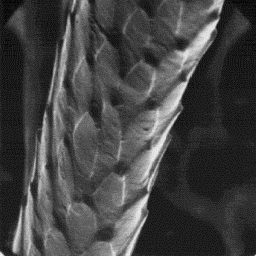 Lutreola lutreola
Lutreola lutreola
-----------------
English: Mink
German: Nerz
French: Vison
Spanish VisĒn o Marta
The medulla is narrow, unbroken and
central symmetrical-shaped in cross-section.
The overall structure of the medulla belongs
to the uniserial ladder type with a granular
infilling substance.
The intermediate fibres are circular in The cuticular structure
cross-sectional outline at the bottom, and of an intermediate hair, 1000x
ellipsoidal in the middle and upper parts,
of the hair shafts. Their diameter is between 25 and 50 µm. The cuticular
scales are wavelike and their surface is smooth. They have straight margins.
The medulla is narrow, unbroken and central symmetrical-shaped in cross-
-section. The medulla belongs to the uniserial ladder type with an amorphous
infilling substance.
|
|
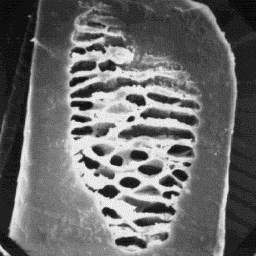 Lutreola lutreola
Lutreola lutreola
-----------------
English: Mink
German: Nerz
French: Vison
Spanish VisĒn o Marta
The guard hairs have a diameter of 60 to
120 µm. The cross-sectional outline is
circular at the bottom but ellipsoidal in
the other parts of the hair shafts. The
cuticular scales are even tile-like close to
the skin surface, wavelike in the middle,
and crenated tile-like at the top of the
shafts. The scale surface is either grooved
or smooth; the scale margins are straight, Transverse section
or rippled in the upper parts of the shaft. of a guard hair, 600x
The medulla is wide, unbroken and central
symmetrical-shaped in cross-section. The overall medullar structure is of the
lattice-sponge-like type with a perforated sheet-like infilling substance.
|
|
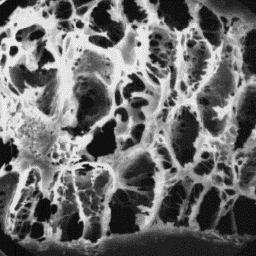 Lutreola lutreola
Lutreola lutreola
-----------------
English: Mink
German: Nerz
French: Vison
Spanish VisĒn o Marta
Detailed structure
of the medulla, 1000x
Numerical code for mink skin structure
--------------------------------------
Surface of the skin: 3-4-3
Fine fur fibres: 6.1-5.11-1-1-3-1-1-1-6-8.21-6.11
Intermediate fibres: 2.1-7-1-1-3-1-1-1-8-25.51-10.21
Guard hairs: 2.1-2.7-2.1-1.2-2-1-1-11-2-60.121-20.31
|




